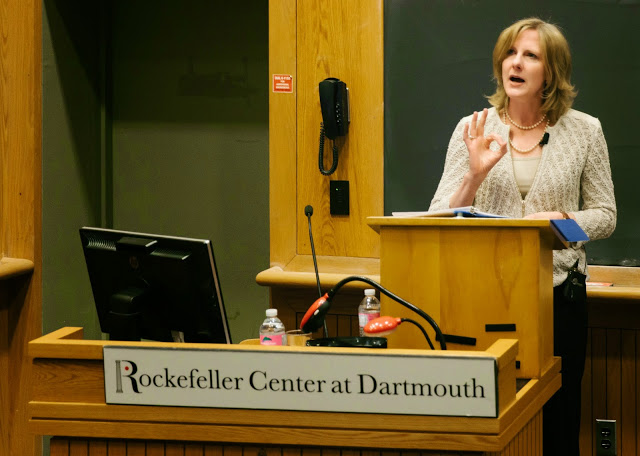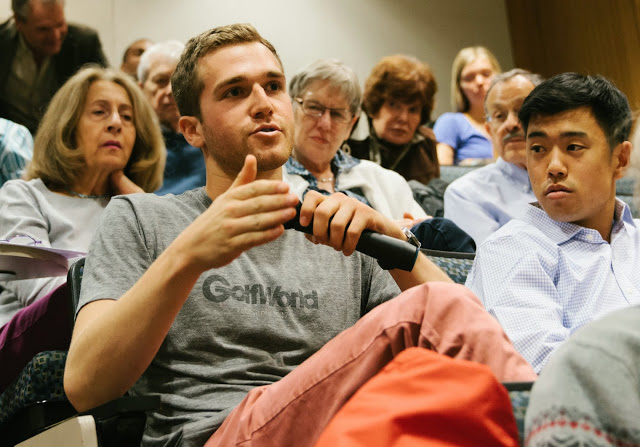- Public Policy
- Leadership
- Funding
- News & Events
- About the Center
Back to Top Nav
Back to Top Nav
Back to Top Nav
Back to Top Nav
Before her Law Day Lecture, "Dark Money and Shadow Parties: The Real Problem in Campaign Finance" with Heather K. Gerken on Thursday, April 30, Courtney Wong '15 sat down with Heather Gerken for an interview.
This year’s celebration of Law Day at Dartmouth focused on the relationship between corporate spending and American politics, and how the Citizens United ruling has led to concerns about "dark money." Heather Gerken, a professor at Yale Law School who specializes in election law and constitutional law, delivered a public talk on the theme of money in politics, examining how the constitutional constraints on campaign finance have affected reform efforts.
Before joining Yale faculty in 2006, Professor Gerken clerked for Judge Stephen Reinhardt and Justice David Souter. After practicing for several years, she joined the Harvard faculty in September 2000. Named one of the nation’s "twenty-six best law teachers," she has also won a Green Bag award for legal writing and has testified three times before the Senate Committee on Rules and Administration. She has also served as a senior legal adviser for the Obama for America campaigns.
 |
| Professor Heather Gerken talks about "dark money" during the Law Day Celebration lecture. Photo by Hung Nguyen '17. |
Courtney Wong (CW): The amount of money donated to elections has been increasing over time. How much "dark money" is really out there in politics?
Heather Gerken (HG): We don’t actually know how much dark money is out there because so much of it is anonymous, which makes it very difficult to measure. The FEC, the Federal Election Commission, has some means of measuring parts of it, but we all think that whatever the FEC reports is less than what is actually out there. So we just don't know how much money is being spent at this point, but we do know that it is increasing, and that is not hard to see.
CW: There are loopholes for people with deep pockets to anonymously donate a ton of money through nonprofits like 501(c)(4)s and 501(c)(6)s. How did it become this way? Can we enforce stricter rules and guidelines for these loopholes?
HG: The Super PACs came about as a result of the Citizens United decision, which said that as long as you spend independently, you can’t cap contributions or control expenditures. Therefore, Super PACs as a formal matter are independent and they can spend however they want. They are, however, regulated by statute and by the FEC so they do have to disclose their donors. The 501(c)(4)s and 501(c)(6)s are under the same rules in terms of independence but unlike Super PACs, they are not governed by statute nor the FEC, which means that they aren’t required to disclose their donors.
You could fix the second piece pretty easily; Congress could pass a law tomorrow that would mandate disclosure, which is constitutional. But since Congress doesn’t really pass legislation these days and the FEC is paralyzed by gridlock, this is unlikely to happen. But on the question whether you can cut back on the independent spending of Super PACs, we’re not going to get a different ruling because as long as those things are thought to be independent, the Court has said that you cannot cut back on the amount of money that is given to them.
CW: Everything about the idea of dark money and shadow parties seems very "House of Cards." How does the existence of these two things affect the way that campaign managers or political staffers will operate?
HG: That's exactly my worry. My worry is that all of the talent will go to the shadow parties. Right now, you’re beginning to see that – for example, Jim Messina is working for Hillary’s Super PAC. That’s because she’s just started her campaign, but the worry is that over time, the big money and the big decisions will get made inside the shadow parties. You’ll see the volunteers and the low-level staff working in the formal, traditional parties, but the real brains of the operation are where the money is. That’s a huge problem for the fate of political parties. It’s very hard to figure out how to stop it because money is power. So if you want to be in the place that’s powerful, you’re going to be where the money is.
 |
| Students engage in a discussion of dark money and shadow parties. Photo by Hung Nguyen '18. |
CW: In terms of dark money and shadow parties, what should we expect in 2016?
HG: First, you’ll see campaigns contracting out a lot of the things that parties used to do. Jeb Bush is already talking about what his Super PAC is going to do, and Hillary Clinton’s Super PAC is doing a huge amount of what parties would have traditionally done already. We saw this in 2014 with Congressional races, where the campaign had almost no money but the Super PAC was running all of the ads and doing most of the things that the party would normally do. Ultimately, we’ll see shadow parties and shadow campaigns playing a much bigger role, maybe even a preeminent role.
The second thing we are going to see is a lot of dark money. Super PACs are not dark, as they disclose their donors. However, there are these things called nonprofit corporations that don’t disclose their donors and as a result, a lot of money is getting funded through them. For example, Karl Rove’s Crossroads GPS put an inordinate amount of money in the 2012 race but didn’t have to disclose any of its donors.
CW: Super PACs seem like huge behemoths that can’t be defeated, especially after Citizens United. What can assure the average Joe citizen that his contribution to the political process can be accounted for?
HG: I sometimes think that some people on the reform side forget that there are elections, so they just assume that whoever has the most money will win. That’s actually not true. You have to have a certain amount of money to compete, but there are lots of other things that matter in an election. On the other hand, money really helps. There is a danger that the political parties are orienting themselves around the interests of the wealthy more than ever before, and leaving the middle and working class behind. All the middle and working class people have is their votes, which matter in the end, but those who are funding the campaign are likely to get their policy interests across. This has become increasingly true in a world of polarized voting.
CW: What is your favorite course to teach in law school?
HG: Right now, it’s a course called Advanced Federalism, which is a course on how to be an academic and write about federalism. A lot of my work is election law-related, but federalism is where election law scholarship meets constitutional law. I’m part of a new group called the Nationalist School, and we’re doing all kinds of work thinking about the ways in which states and localities serve important roles. The course is so fun because the work is just brimming over and the students are brilliant. Yale puts out a ton of academics so it’s like hanging out with your buddies and talking about scholarship.